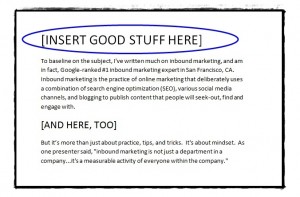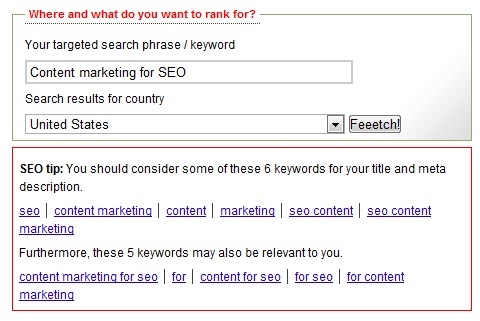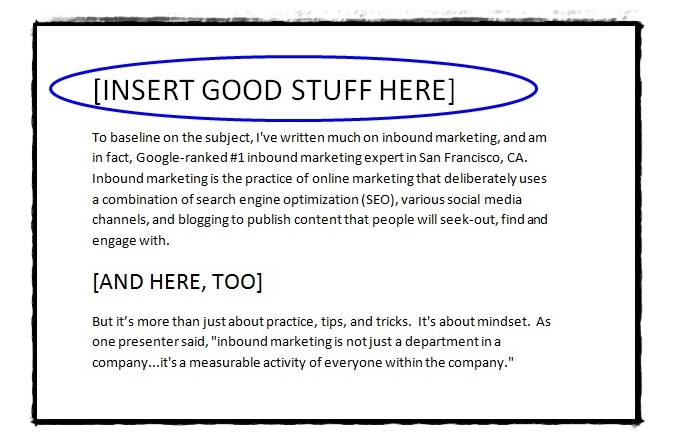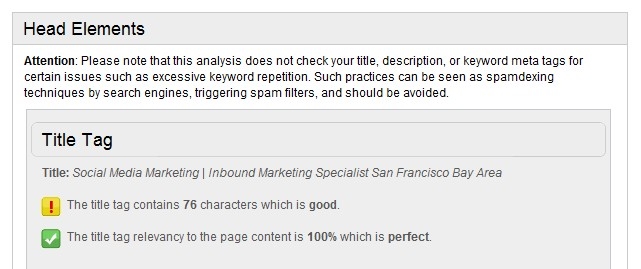 SEO Strategy for Titles and Headings
SEO Strategy for Titles and Headings
As published in Business2Community
When it comes to SEO strategy, there are two fundamental areas where we as authors can directly impact our search engine ranking effectiveness–Title tags and article headings. In part one of this two part series, “Good Content Deserves Good SEO,” we focus on article title tags.
Using Titles to Improve Your On-Page Optimization
To level-set, a title tag is the main text that describes an online document. It’s the value you assign the tag, and the single most important on-page SEO element (behind overall content). It tells people and search engines what your page is about. This is how Google displays the value (after a search query of “inbound marketing expert San Francisco“):
This is how the title tag appears in your browser:
Aside of being a powerful SEO element, your page title serves to engage the reader. Creating a compelling title tag will pull in more visits from search results, incite sharing via social media tools, and, paired with good, matching content, result in book-marking. When reached by search, the title tag is a reader’s first impression with your content and your brand. It’s important to remember that the title tag should let both search engines and readers know what the document is about, so it’s important to reach a balance between both optimization and keyword usage, but reader experience and perception, as well.
Creating Your Title Tag
Creating a descriptive, keyword-considerate title tag is important for increasing rankings in search engines. A common sentiment among SEO experts is that keyword usage in your title tag is the most important place to use keywords to achieve high rankings. I like to use this free SEO tool from SEOBin.org to help create title and meta descriptions. Enter what keywords you want to rank for, and in what country/geography, and the tool generates some workable title variations for you.

Three Common Web Title SEO Mistakes
1. Title Length
Google displays up to 70 characters of a given page title in their SERPs. Therefore, short page titles will limit the potential of a page to rank for several keywords. But while it’s important to smartly use up to these 70 characters, it’s equally important not to overdo it. Keep in mind that the more keywords you have in your title, the more diluted they become. Creating good titles for good SEO requires that you give your web pages meanings, without making your readers have to re-read, digest, or think about what your page title is really saying. My rule of thumb is that if it appears SEO’d, it probably requires a re-write.
2. Keyword Saturation
Don’t stuff your page title with too many keywords. Back in the 1990’s that may have worked to improve your search engine rankings, but it no longer does. Google and others have grown smarter and they know when you’re trying to trick them. And if your page is inconsistent and irrelevant to your page title, it will cause readers to leave, generating high bounce rates that don’t bode well with search engines, either. My rule of thumb here is, make it unique, but make it readable at an 8th grade reading level.
3. When and Where Your Brand Name is Used
Many website owners like to include their business name in their page title. Some even more zealous ones like to have it appear first in every single web page. Don’t follow suit. Including your company name (unless it’s a search term that will likely be used), is unnecessary on all pages, and can bring about search engine flags you don’t want. Besides, it reduces your available character count:
There are lots of varied opinions on this, but my general thought is that, for proper brand-building, displaying your company name in the homepage, contact page, and “about” page makes sense. However, I like to avoid using them in content pages. This is subjective, and very dependent on the industry, brand, and usage.
Great Free Keyword Tools
- Keyword suggestion tool from Self SEO
- Header Checker from Internet Marketing Ninjas
- and Title tag checker from SEO Workers, that generates this type of concise report:






